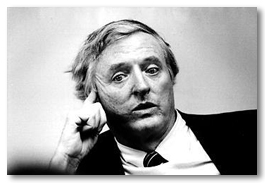William F. Buckley Jr. a splendid soul
- FATHER RAYMOND J. DE SOUZA
We came first to pray for William F. Buckley, Jr., and then to praise him.

|
He would have wanted it that way, for he was first a Christian disciple, and only secondarily, very much secondarily, well, everything else journalist, novelist, belletrist, harpsichordist, sailor, skier, and, above all, godfather to the American conservative movement.
The memorial Mass yesterday at Saint Patricks Cathedral followed a private funeral held soon after his death on Feb. 27. It was the public remembrance of a man whose influence on American public affairs was second to very few, being as he was the intellectual architect of the Reagan Revolution.
Yet there was no mention yesterday of Ronald Reagan in particular, or even politics more generally. The homilist, his friend Father George Rutler, noted that he used words to break down the Berlin Wall, but he spoke more about how no human enterprise for him was merely a human enterprise. All of it was shot through with a hint of the divine and sometimes, in the exuberant way he lived his life a shout.
Adapting Edmund Burke, eulogist Dr. Henry Kissinger spoke of Buckley not believing in either permanent victories or permanent defeats, but rather in permanent values. His Catholic faith shaped that view; because of human sinfulness no victory is ever completely won, and thanks to divine grace, no defeat is ever permanent. The lasting things indeed are not the victories or defeats in this earthly sojourn.
Buckley remains an outstanding example of the Christian in public life. His foundational convictions were animated by his faith, namely that every human life, originating in God and destined for Him, is entitled to that liberty which permits it to flourish in creative co-operation with the divine. His strongest political passion anti-communism was driven by his conviction that it was not merely inefficient, but evil, not merely mistaken, but theologically wrong.
Yet, for some 60 years in public life, he never conducted himself in an exclusive or confessional mode. His deepest convictions were religious; his public arguments were not. So it was that Jews and Protestants from politics and letters were here in the front pews, honouring him and his faith with their presence.
It was his Catholicism that made him so keen to ensure that politics, that necessary and noble cause, served its true purpose, which is to leave plenty of room for the more necessary and nobler things still the things which are beautiful and lovely, and to which we owe our love.
He was, too, a witness. Kissinger recalled discussing with Buckley the progression from knowledge to faith, and perhaps the latter shared something with the former, as the battle-weary old diplomat, known neither for religion nor sentiment, with voice breaking with emotion, thanked a benign Providence for granting us a life touched by the grace of God.
There was Bach, and the great hymns which he liked, and of course the Mass itself, to which he was so devoted. It was his Catholicism that made him so keen to ensure that politics, that necessary and noble cause, served its true purpose, which is to leave plenty of room for the more necessary and nobler things still the things which are beautiful and lovely, and to which we owe our love.
He did not often refer to his faith, but rather it provided the frame of reference for everything. In the latest book, published just a few months ago, he mentions in passing National Review: the fortnightly journal of opinion with which I have been associated pre partum, in partu, and post partum. Thats the old Latin formula specifying the dogma of the perpetual virginity of Mary; for Buckley it was as natural to refer to the catechism as it was nautical metaphors or historical allusions.
In an age when funerals are tending in the direction of testimonial dinners, and it sometimes seems that a reading of the curriculum vitae is more apt that the words of holy writ, the memorial Mass here was a splendid Christian rite for a splendid Christian soul, a faithful Catholic being given the final blessings of the Church he loved.
His last book was about Barry Goldwater and the heady days of the new political movement for which Buckley was the principal driving force. It is written as an-almost memoir, and the author does not apologize for his presence in the tale: It was a grand time we had, proving all that political experiences could yield, joys and sorrows, excitement and depression. It would have been wrong, and ungrateful, to keep all of this to oneself. He was grateful, and he did not keep it to himself. And now all those who are so grateful to him pray that he enjoys the company of the saints, where there is joy and sorrow no more.
![]()
 This is Meaghen Gonzalez, Editor of CERC. I hope you appreciated this piece. We curate these articles especially for believers like you.
This is Meaghen Gonzalez, Editor of CERC. I hope you appreciated this piece. We curate these articles especially for believers like you.
Please show your appreciation by making a $3 donation. CERC is entirely reader supported.

Acknowledgement
Father Raymond J. de Souza. "William F. Buckley Jr. a splendid soul." National Post, (Canada) April 5, 2008.
Reprinted with permission of the National Post and Fr. de Souza.
The Author
Father Raymond J. de Souza is the founding editor of Convivium magazine.
Copyright © 2008 National Post



